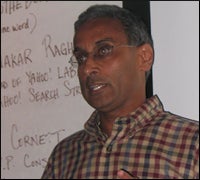 |
| Yahoo’s Prabhakar Raghavan Photo: David Needle |
SAN FRANCISCO — Yahoo picked the first anniversary of its launch of SearchMonkey to update the public on its progress on several key fronts, including improvements to mobile and image-related results.
SearchMonkey gives site owners a structured way to expose key data to Yahoo’s search engine, so, for example, a restaurant’s menu or location would have a better chance of showing up in a relevant search. A Yahoo (NASDAQ: YHOO) user searching for Chinese food would get the specific name and address of a relevant, local restaurant and ratings among the top results.
The idea is to get beyond the standard list of links in a typical search results page by including more at-a-glance, relevant information.
“We want to get away from the legacy of the ten blue links” on a results page, said Prabhakar Raghavan, Yahoo’s chief search strategist and head of Yahoo Labs. He said “no one really wants to search” — they just want results. But too often, the process of getting results involves having to winnow out too many irrelevant results.
Yahoo said over 70 million “enhanced” SearchMonkey results are viewed on a daily basis in 23 markets worldwide, and over 15,000 developers have registered to build SearchMonkey applications, including Facebook, Yelp and LinkedIn. Raghavan also said site owners have seen a more than 15 percent
increase in the click-through rates of their SearchMonkey search results when tested against non-SearchMonkey results.
Currently the No. 2 player in search with about 20 percent of the market, Yahoo is hoping to make headway against search leader Google (NASDAQ: GOOG), which last week rolled out several improvements designed to streamline access to relevant search results.
Raghavan showed how Yahoo is improving its oneSearch mobile search engine by customizing results for the mobile form factor, and by using GPS technology that lets the search engine know a user’s location.
In one example, a search for “Star Trek” would give movie times and location of nearby theaters playing the movie. Or typing in “cheap gas” might show local service stations ranked by price.
“When you’re doing a mobile search, you don’t want 10 million results,” he said. “We need to move from a Web of pages to a Web of objects” — meaning real-world things, like restaurants, landmarks and people for which users search.
“Others are taking PC search and stuffing it into a mobile device. In a sense we’re taking it back to the Web,” he added.
Yahoo today also previewed technology that automatically includes related images in users’ search results. For example, a search on Paris would show an image of the Eiffel Tower and a series of related images from there. The feature is still in development, however.
Larry Cornett, vice president of Yahoo Search, said the company is seeking to strike a balance between real-time and most relevant results.
“A Twitter search will give you what’s being said right now, but in a search engine you want more precision and relevancy,” he said. “We don’t want to sacrifice relevancy and precision, but we’re investing in being able to discover, crawl and index fresh content as fast as possible.”
Who’s the BOSS?
Yahoo also provided an update on progress in its Build Your Own Search Service (BOSS) initiative, which essentially makes the Yahoo search infrastructure available to other, more specialized search engines, which can then build on it.
So far, Yahoo is finding its share of takers.
[cob:Special_Report]”We’re good at finding information in the deep Web, but we didn’t want to have to reinvent crawling open Web pages,” said Matthew Hertz, CEO of people-finding search engine Pipl.com.
Yahoo said the combined queries from BOSS partner Web sites is on track to reach 1 billion monthly queries in May — about three times as many as it had six months ago. Yahoo also said that total beats the combined searches on Ask and Facebook, and is just behind Microsoft (NASDAQ: MSFT).
All of Yahoo’s efforts to expand its search to new vistas is no surprise to search consultant Greg Sterling, who said Yahoo is in a race with Google, Microsoft and others to give users the most effective and efficient search experience.
“Yahoo’s had a lot of separate technology initiatives, and now we’re seeing how they’re tying them all together,” Sterling told InternetNews.com. “Conceptually, I think they’re on the right track in moving to what people want to find in the real world. The proof of how well this does is going to
be in the user experience.”
Yahoo officials said they’re still testing services — like the image search enhancements — that could be released in the next few months depending on how well they do in consumer testing.
“The technology is there, but how well the presentation is accepted matters before we release anything,” Raghavan said.


